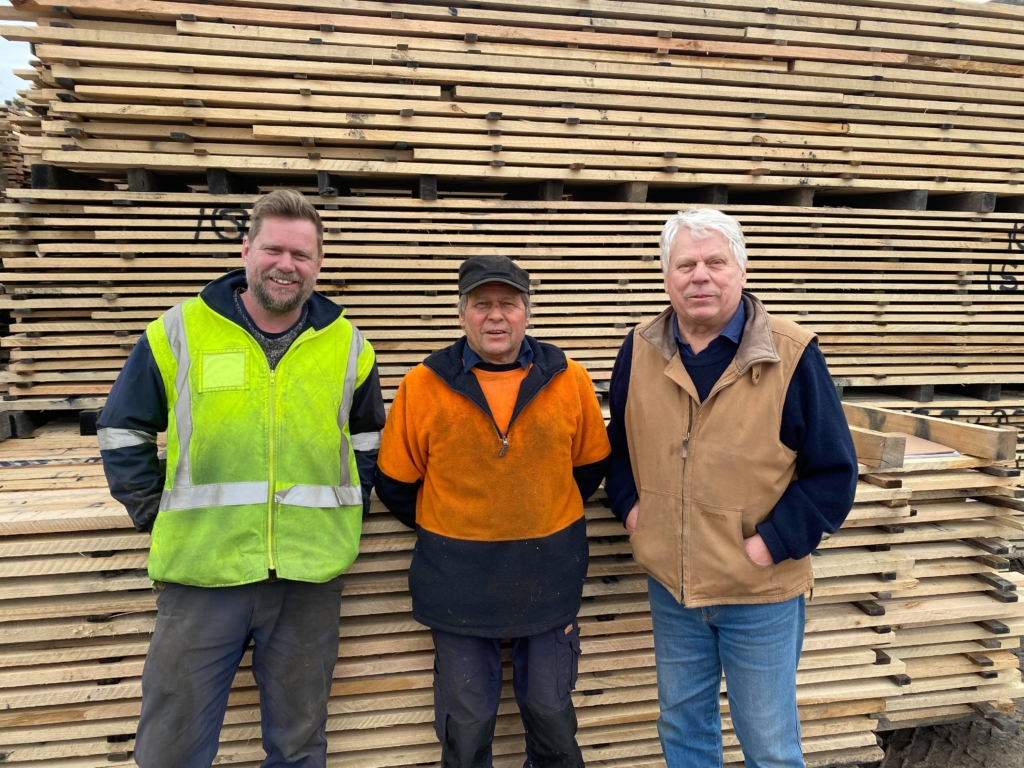 Montréal, Quebec – Domtar Wood Products announced today a curtailment in its lumber production. Due to challenging market conditions and ongoing economic uncertainty, Domtar will temporarily reduce its lumber production by 100 million board feet for the fourth quarter of 2025, including additional curtailments for the holiday season, at its facilities in Quebec, Ontario, and the United States. “Demand for lumber continues to stagnate in North America, exacerbating an already difficult market,” said Luc Thériault, President of Domtar Wood Products. Domtar will continue to monitor market conditions and adjust its production plans accordingly. [END]
Montréal, Quebec – Domtar Wood Products announced today a curtailment in its lumber production. Due to challenging market conditions and ongoing economic uncertainty, Domtar will temporarily reduce its lumber production by 100 million board feet for the fourth quarter of 2025, including additional curtailments for the holiday season, at its facilities in Quebec, Ontario, and the United States. “Demand for lumber continues to stagnate in North America, exacerbating an already difficult market,” said Luc Thériault, President of Domtar Wood Products. Domtar will continue to monitor market conditions and adjust its production plans accordingly. [END]
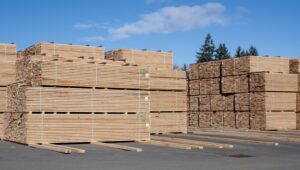 The federal government has rejected an industry request for payouts to softwood producers in Canada on the hook for US duties, fearing that direct intervention would further irritate the US. Canadian softwood producers have paid more than $10-billion since 2017 in accumulated duties, which are cash deposits held in trust by the US that collect interest. The producers expect the US to refund a portion of the duties if and when the two countries resolve the trade dispute. In the meantime, the industry has suggested that the Canadian government make payouts to reflect the present value of anticipated refunds. The two sources said Ottawa would have received any future refunds in exchange for injecting much-needed liquidity into the struggling industry. Ottawa rejected the idea because of fears that such payouts would be viewed as subsidies and become a serious irritant during the wider US trade war, according to a senior government official. [to access the full story a Globe & Mail subscription is required]
The federal government has rejected an industry request for payouts to softwood producers in Canada on the hook for US duties, fearing that direct intervention would further irritate the US. Canadian softwood producers have paid more than $10-billion since 2017 in accumulated duties, which are cash deposits held in trust by the US that collect interest. The producers expect the US to refund a portion of the duties if and when the two countries resolve the trade dispute. In the meantime, the industry has suggested that the Canadian government make payouts to reflect the present value of anticipated refunds. The two sources said Ottawa would have received any future refunds in exchange for injecting much-needed liquidity into the struggling industry. Ottawa rejected the idea because of fears that such payouts would be viewed as subsidies and become a serious irritant during the wider US trade war, according to a senior government official. [to access the full story a Globe & Mail subscription is required]
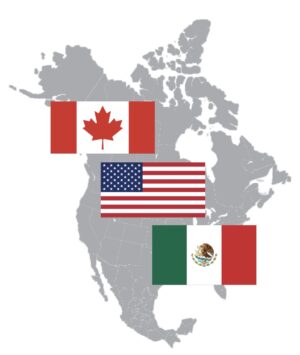 As Canada’s trade deal with the US and Mexico faces a crucial review, many US industries are urging the Trump administration to preserve the agreement and to stop putting tariffs on imports from its northern and southern neighbours. Ahead of the public hearings scheduled this week, some of the heaviest hitters in the U.S. manufacturing, industrial and retail sectors have submitted briefs extolling the agreement’s benefits to the domestic economy. …CUSMA is “the most pro-US manufacturing trade agreement in history,” said the National Association of Manufacturers, the largest organization in a sector that contributes $2.9 trillion US to the nation’s GDP. …The National Association of Home Builders calls on the Trump administration to scrap all tariffs on building material imported from Canada and Mexico, including Canadian softwood lumber, which it says “fills a unique niche in residential construction that is not easily replaced with domestic sources.”
As Canada’s trade deal with the US and Mexico faces a crucial review, many US industries are urging the Trump administration to preserve the agreement and to stop putting tariffs on imports from its northern and southern neighbours. Ahead of the public hearings scheduled this week, some of the heaviest hitters in the U.S. manufacturing, industrial and retail sectors have submitted briefs extolling the agreement’s benefits to the domestic economy. …CUSMA is “the most pro-US manufacturing trade agreement in history,” said the National Association of Manufacturers, the largest organization in a sector that contributes $2.9 trillion US to the nation’s GDP. …The National Association of Home Builders calls on the Trump administration to scrap all tariffs on building material imported from Canada and Mexico, including Canadian softwood lumber, which it says “fills a unique niche in residential construction that is not easily replaced with domestic sources.” The much-pilloried Canada-U.S.-Mexico trade agreement was signed seven years ago this weekend—on November 30, 2018. A year later, it was amended to address rules of origin for autos, digital trade, IP, dairy and, who could forget, a sunset clause. We can all do the math. The December 10, 2019 amendments set in motion a 16-year term for the agreement, with a mandatory review every six years. Which means we’ll see more of a requiem than a birthday bash next week when Mark Carney is in Washington to help kick off the 2026 FIFA World Cup. But don’t bury CUSMA just yet. Despite the U.S. President’s freeze on negotiations, officials from both countries are talking every day and laying the groundwork for what will be an intense 2026. Not many insiders seriously expect CUSMA to go away; they’re working on changes—modifications, enhancements, renovations, depending on your point of view—that will continue to change the fabric of continental commerce.
The much-pilloried Canada-U.S.-Mexico trade agreement was signed seven years ago this weekend—on November 30, 2018. A year later, it was amended to address rules of origin for autos, digital trade, IP, dairy and, who could forget, a sunset clause. We can all do the math. The December 10, 2019 amendments set in motion a 16-year term for the agreement, with a mandatory review every six years. Which means we’ll see more of a requiem than a birthday bash next week when Mark Carney is in Washington to help kick off the 2026 FIFA World Cup. But don’t bury CUSMA just yet. Despite the U.S. President’s freeze on negotiations, officials from both countries are talking every day and laying the groundwork for what will be an intense 2026. Not many insiders seriously expect CUSMA to go away; they’re working on changes—modifications, enhancements, renovations, depending on your point of view—that will continue to change the fabric of continental commerce.
 The United Steelworkers union (USW) welcomes the federal government’s new measures to support Canada’s steel and softwood lumber sectors, calling them a meaningful step forward in the face of US tariffs and global market instability. The package includes tighter import controls, a 25% surtax on steel derivatives, strengthened border enforcement, expanded liquidity supports for softwood producers, a top-up to the Work-Sharing program, lower interprovincial freight costs, and new domestic-content requirements for federal projects. …Marty Warren, USW National Director… underscored that the Work-Sharing top-up will help workers stay on the job during temporary downturns and also pointed to the importance of strengthening procurement rules. On softwood lumber, the union welcomes the government’s efforts… “But let’s be honest, forestry towns cannot rebuild on temporary fixes. A long-term resolution to the softwood lumber dispute with the United States is essential. Without it, workers and communities remain vulnerable to decisions they cannot control.”
The United Steelworkers union (USW) welcomes the federal government’s new measures to support Canada’s steel and softwood lumber sectors, calling them a meaningful step forward in the face of US tariffs and global market instability. The package includes tighter import controls, a 25% surtax on steel derivatives, strengthened border enforcement, expanded liquidity supports for softwood producers, a top-up to the Work-Sharing program, lower interprovincial freight costs, and new domestic-content requirements for federal projects. …Marty Warren, USW National Director… underscored that the Work-Sharing top-up will help workers stay on the job during temporary downturns and also pointed to the importance of strengthening procurement rules. On softwood lumber, the union welcomes the government’s efforts… “But let’s be honest, forestry towns cannot rebuild on temporary fixes. A long-term resolution to the softwood lumber dispute with the United States is essential. Without it, workers and communities remain vulnerable to decisions they cannot control.”


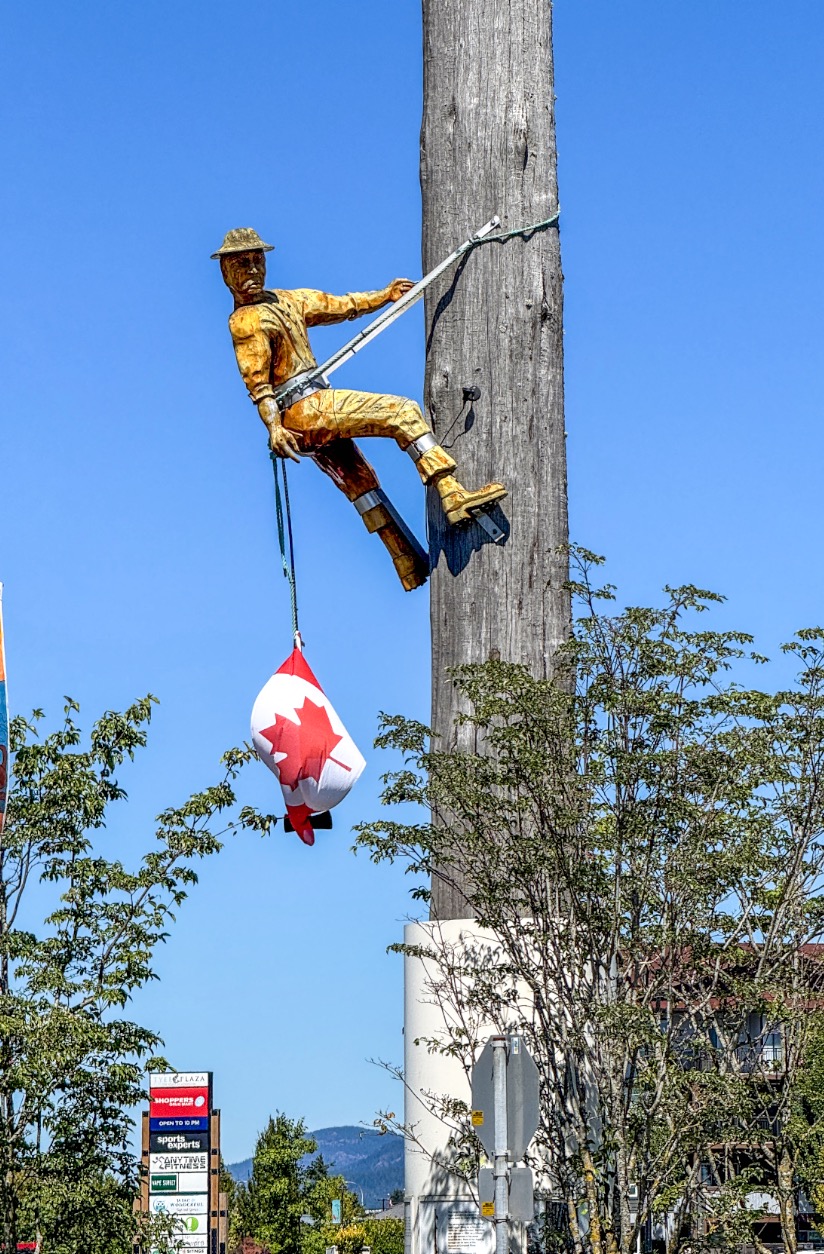 More than 100 unionized North Island forestry workers on strike rallied in Campbell River on Wednesday. They’ve been without a contract for more than six months. They warned their employer that they are united and will succeed in their demands… The United Steelworkers marched to the Campbell River offices of Western Forest Products… The company owns a controlling 55 per cent share of La-kwa sa muqw Forestry (LKSM). On Oct. 20, the union filed a common-employer application with the Labour Relations Board. “…we’re challenging the fact that LKSM is actually a separate company. …We believe our members deserve the same collective agreement that all WFP members have,” said Brian Butler, president of United Steelworkers Local 1-1937 …“What this issue is really about is the union’s demand that it wants all contractors, new contractors, working for us, including First Nation contractors, to be mandatorily certified with the union,” said Greg DeMille, Operations Manager of La-kwa sa muqw Forestry.
More than 100 unionized North Island forestry workers on strike rallied in Campbell River on Wednesday. They’ve been without a contract for more than six months. They warned their employer that they are united and will succeed in their demands… The United Steelworkers marched to the Campbell River offices of Western Forest Products… The company owns a controlling 55 per cent share of La-kwa sa muqw Forestry (LKSM). On Oct. 20, the union filed a common-employer application with the Labour Relations Board. “…we’re challenging the fact that LKSM is actually a separate company. …We believe our members deserve the same collective agreement that all WFP members have,” said Brian Butler, president of United Steelworkers Local 1-1937 …“What this issue is really about is the union’s demand that it wants all contractors, new contractors, working for us, including First Nation contractors, to be mandatorily certified with the union,” said Greg DeMille, Operations Manager of La-kwa sa muqw Forestry.


 CROFTON, BC — The company that runs a pulp mill on Vancouver Island says it is permanently ending operations at the facility, affecting around 350 employees. Domtar says pulp operations at the mill in Crofton, about 70 kilometres north of Victoria, have been struggling for a while. Last year, Domtar announced that it was indefinitely halting paper operations at the site, which affected around 75 employees at the time. Domtar, formerly called Paper Excellence, confirmed that this latest curtailment will permanently close the entire site. The company says the site will continue to be managed in compliance with environmental laws, and it’s “exploring a variety of possibilities for the future of the site.” …Chris Stoicheff clarified that the mill will cease operations on Dec. 15 but most staff will still be employed at the mill until mid-February, some until April. Stoicheff says the company has three remaining mills in BC.
CROFTON, BC — The company that runs a pulp mill on Vancouver Island says it is permanently ending operations at the facility, affecting around 350 employees. Domtar says pulp operations at the mill in Crofton, about 70 kilometres north of Victoria, have been struggling for a while. Last year, Domtar announced that it was indefinitely halting paper operations at the site, which affected around 75 employees at the time. Domtar, formerly called Paper Excellence, confirmed that this latest curtailment will permanently close the entire site. The company says the site will continue to be managed in compliance with environmental laws, and it’s “exploring a variety of possibilities for the future of the site.” …Chris Stoicheff clarified that the mill will cease operations on Dec. 15 but most staff will still be employed at the mill until mid-February, some until April. Stoicheff says the company has three remaining mills in BC. 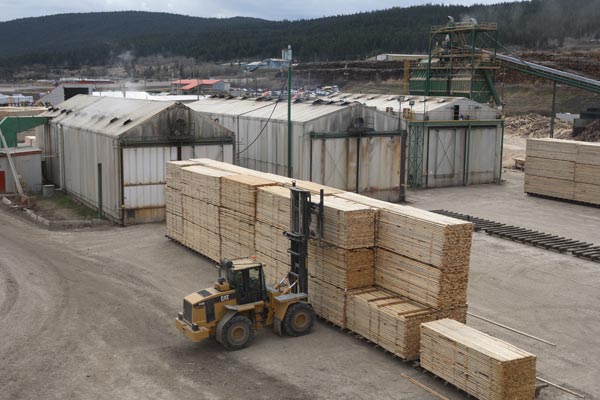

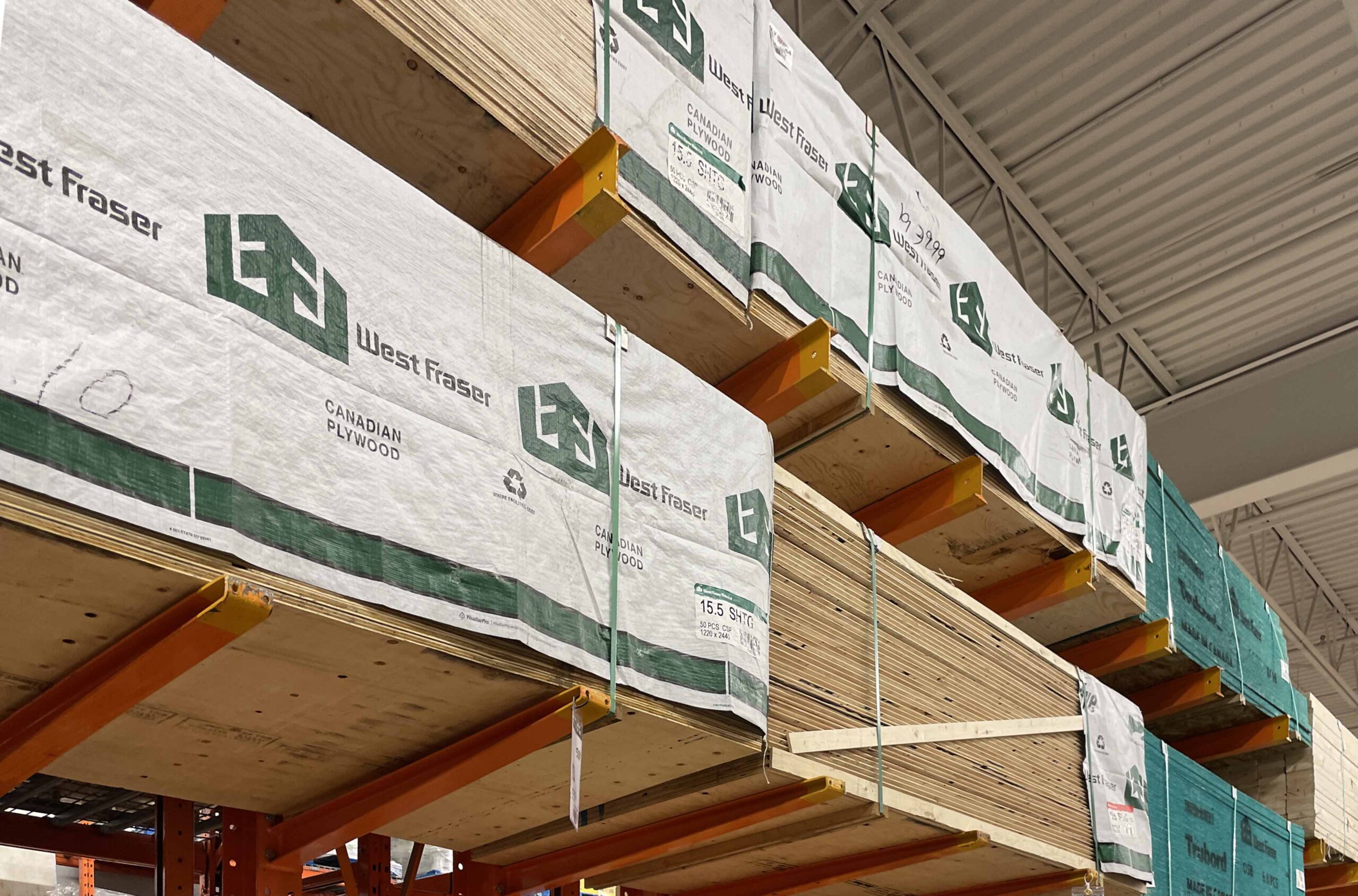 The District of 100 Mile House’s mayor and one of its councillors went to Victoria for meetings with provincial government officials over the impending West Fraser Mill closures on Monday, Nov. 24. During the Mayor’s Report at the Nov. 25 District of 100 Mile House Council meeting, Mayor Maureen Pinkney and Coun. Donna Barnett both revealed details about a visit to Victoria regarding issues surrounding 100 Mile, including the impending permanent closure of the 100 Mile West Fraser mill, as well as frequent closures of the emergency department at the 100 Mile Hospital. On Nov. 6, West Fraser Lumber announced in a release that it would be closing its 100 Mile House lumber mill following a two-month wind-down.
The District of 100 Mile House’s mayor and one of its councillors went to Victoria for meetings with provincial government officials over the impending West Fraser Mill closures on Monday, Nov. 24. During the Mayor’s Report at the Nov. 25 District of 100 Mile House Council meeting, Mayor Maureen Pinkney and Coun. Donna Barnett both revealed details about a visit to Victoria regarding issues surrounding 100 Mile, including the impending permanent closure of the 100 Mile West Fraser mill, as well as frequent closures of the emergency department at the 100 Mile Hospital. On Nov. 6, West Fraser Lumber announced in a release that it would be closing its 100 Mile House lumber mill following a two-month wind-down.

 MACKENZIE, BC — Forestry company Conifex Timber announced that it will temporarily curtail operations at its Mackenzie, BC sawmill for a planned four-week period commencing December 15, 2025. The curtailment is being implemented in response to, among other things, continued weakness in North American lumber markets. The curtailments will begin on December 15, for a planned four-week duration, Conifex said, adding that it is expected to reduce production by roughly 13 million board feet. The North American timber industry has gone through several curtailments in response to US President Trump’s decision to implement tariffs. …The company said it does not anticipate any challenges in securing sawlogs to maintain capacity operations in the future, once market conditions permit a return to full operations. It also expects to see gradual recovery in demand in the second half of 2026.
MACKENZIE, BC — Forestry company Conifex Timber announced that it will temporarily curtail operations at its Mackenzie, BC sawmill for a planned four-week period commencing December 15, 2025. The curtailment is being implemented in response to, among other things, continued weakness in North American lumber markets. The curtailments will begin on December 15, for a planned four-week duration, Conifex said, adding that it is expected to reduce production by roughly 13 million board feet. The North American timber industry has gone through several curtailments in response to US President Trump’s decision to implement tariffs. …The company said it does not anticipate any challenges in securing sawlogs to maintain capacity operations in the future, once market conditions permit a return to full operations. It also expects to see gradual recovery in demand in the second half of 2026.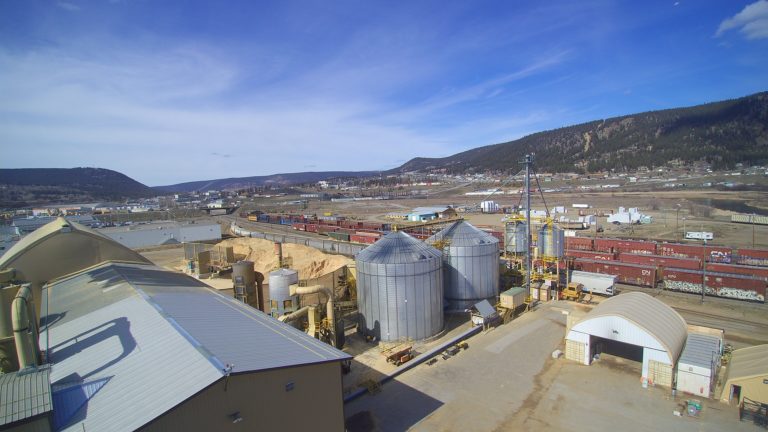





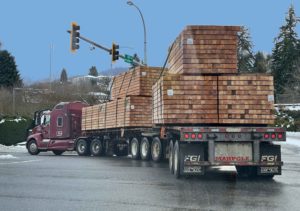 Ottawa threw the beleaguered softwood lumber industry a bone. …The new measures include $500 million in new loan guarantees for softwood lumber companies. “Loans are only good if i can sell my prioduct and pay for those loans,” said Brian Menzies, at the Independent Wood Processors Association of BC. “At 45%, I can t sell my product into the United States.” Other steps announced include cutting freight rates. …The measures are window dressing – say some – when compared to the impact of the steel industry supports. “I’m afraid we’ve come to the point that ‘Sophies choice’ is happening and softwood lumber is the child who’s going to be left behind,” said Menzies. It’s a concern shared at Leslie Forest Products, in Delta where James Sanghera said the measures won’t make a difference. “Most of the wood we’re sending down to the States is going on truck.”
Ottawa threw the beleaguered softwood lumber industry a bone. …The new measures include $500 million in new loan guarantees for softwood lumber companies. “Loans are only good if i can sell my prioduct and pay for those loans,” said Brian Menzies, at the Independent Wood Processors Association of BC. “At 45%, I can t sell my product into the United States.” Other steps announced include cutting freight rates. …The measures are window dressing – say some – when compared to the impact of the steel industry supports. “I’m afraid we’ve come to the point that ‘Sophies choice’ is happening and softwood lumber is the child who’s going to be left behind,” said Menzies. It’s a concern shared at Leslie Forest Products, in Delta where James Sanghera said the measures won’t make a difference. “Most of the wood we’re sending down to the States is going on truck.”

 Private woodlot owner Andrew Clark says this year is one of the toughest he’s seen in the six decades he’s worked in the woods. For him, sales are ‘maybe 50 per cent’ of what they were last year. “It is the lack of markets which are the result of the tremendous uncertainty that the industry is in now because of the actions of the American government,” he said. He feels some of the federal government’s new supports – announced this week – could help. Prime Minister Mark Carney announced Wednesday a $500-million increase to the previously announced Softwood Lumber Development Program, which gives companies access to government-backed loans, totaling $1.2 billion. He also said Ottawa is working with railway companies to cut freight rates when transporting Canadian lumber across the country by 50 per cent. But Clark says the current situation – with the U.S. duties and tariffs amounting to 45 per cent – isn’t sustainable.
Private woodlot owner Andrew Clark says this year is one of the toughest he’s seen in the six decades he’s worked in the woods. For him, sales are ‘maybe 50 per cent’ of what they were last year. “It is the lack of markets which are the result of the tremendous uncertainty that the industry is in now because of the actions of the American government,” he said. He feels some of the federal government’s new supports – announced this week – could help. Prime Minister Mark Carney announced Wednesday a $500-million increase to the previously announced Softwood Lumber Development Program, which gives companies access to government-backed loans, totaling $1.2 billion. He also said Ottawa is working with railway companies to cut freight rates when transporting Canadian lumber across the country by 50 per cent. But Clark says the current situation – with the U.S. duties and tariffs amounting to 45 per cent – isn’t sustainable.







